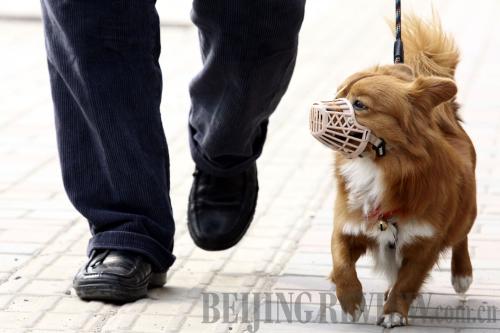|
 |
|
STOP BITING: A dog wears a muzzle and walks on a leash with its owner in north China's Tianjin (LI XIANG) |
A 6-year-old girl recently died due to the bite of a Tibetan mastiff in Dalian, in northeast China's Liaoning Province. One month before, an elderly man was also bitten to death by two fierce dogs while he was doing morning exercises in Zunyi, southwest China's Guizhou Province. In May, five people were attacked by Tibetan mastiffs in Beijing.
In response to a series of recent dog-related incidents, Beijing police have launched a citywide crackdown on large and dangerous dogs. A rule by the Beijing Municipal Public Security Bureau bans dogs 35 cm in height or taller and 41 breeds identified as violent. Dog owners who breach the rule will be fined 5,000 yuan ($813), while organizations with illegal dogs will face a 10,000-yuan ($1,626) charge and have their animals taken away to an official dog shelter.
There has been heated debate on how to deal with pets. Some argue that ferocious dogs should be banned in cities while others say the government should do more to handle the tension between dog owners and potential victims.
Jiang Debin (Xinhua Daily Telegraph): Tibetan mastiffs fall into the category of huge and dangerous dogs. Such animals should never be allowed to appear on the streets of cities. There must be strict regulations and restrictions on the rearing and walking of such dogs.
People have the right to keep pets. As long as they do it in line with legal regulations, this right should be respected. Incidents of dog attacks have occurred frequently recently. Accordingly, it's important to investigate such incidents and not randomly ban animals from public spaces. There must be a consensus reached via discussions concerning pets, to satisfy various sides.
Some cities have already worked out regional dog management regulations, including punishment statutes. However, these rules are seldom put into practice. Instead, relevant departments are more interested in issuing canine ID certificates for registered dogs and injecting vaccines, which involve fee charges from owners. At the same time, every year, some unregistered dogs are slaughtered. This kind of dog management is rough and simple, and should be held responsible for most dog-related accidents.
Jia Chunqiang (www.people.com.cn): It's a tragedy to see a 6-year-old girl killed by the Tibetan mastiff. The dog owner should surely be punished for what the animal has done. At the same time, what lies behind this tragedy, and many similar accidents, is the lack of effective management by relevant government departments.
On one hand, we are shocked by frequent incidents involving dog attacking, hurting and even killing people; on the other hand, relevant rules and regulations on dog management are not well implemented.
People have the right to raise dogs, but every dog owner should respect other citizens' legitimate rights and obey basic laws and moral standards. With the improvement of people's living conditions, to raise a pet dog is becoming a fashion. Whether people should be allowed to raise huge and dangerous dogs in densely populated districts is still a question to be answered. In some extreme cases, pets are not good-natured, but are frightening animals like snakes and crocodiles.
Some people are interested in fierce animals. However, they are often hard to tame. They always pose a serious threat to people around them. Meanwhile, China's management of pets is generally still a mess. There is no explicit definition on what pets should be and thus dangerous animals are also allowed to be raised. Moreover, more people tend to choose dangerous animals as pets. Due to the lack of relevant legal regulations, owners take very small risks in raising such fierce pets. As a result, we see more frequent attacks on people.
The strict management on pet dogs in other countries strikes a sharp contrast to what is happening in China. For example, in Italy, very offensive dogs are forbidden to be kept as pets, and families rearing dangerous breeds must get insurance for their dogs, so that those attacked by their dogs will get paid. In Germany, those who plan to rear dogs must have relevant departments inspect their economic conditions and so on. After the procedure has finished for dog adoption, owners must accompany their dogs to special schools for a three-month training course, during which the dogs will be trained to obey their owners. Dogs will learn how to live in harmony with people around them and will also be taught to recognize traffic lights and similar things.
Therefore, in the face of frequent fierce dog attacks on people, it's time to take effective measures. It's important to raise the threshold for pet raising, to implement an insurance system on pets and try to use strict legal regulations to stop dogs attacking people. What we are working for is to ensure some people's right to raise pets as well as other's health and safety.
| 